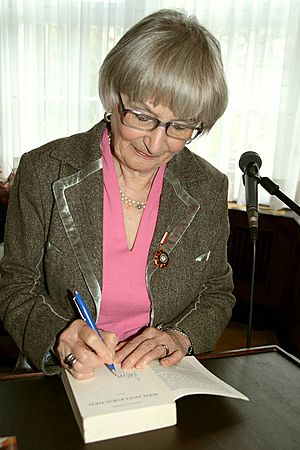Leonie Ossowski facts for kids
Quick facts for kids
Leonie Ossowski
|
|
|---|---|

Ossowski in 2007
|
|
| Born | Jolanthe von Brandenstein 15 August 1925 Röhrsdorf, Posen-West Prussia, Weimar Germany |
| Died | 4 February 2019 (aged 93) Berlin, Germany |
| Nationality | German |
| Genre | short story, novel, children's literature, screenplay |
| Notable awards |
|
Jolanthe von Brandenstein (born August 15, 1925 – died February 4, 2019) was a German writer. She was best known by her pen name Leonie Ossowski. A pen name is a fake name a writer uses instead of their real name. She also used the name Jo Tiedemann. Leonie Ossowski wrote many different types of books. She wrote novels, short stories, and non-fiction books. She also wrote screenplays, which are scripts for movies or TV shows. One of her most famous books was Die große Flatter. It was a novel for young adults and was made into a popular TV show. She won important awards like the Hermann Kesten Medal and the Adolf-Grimme-Preis.
Contents
Leonie Ossowski's Early Life and Career
Leonie Ossowski was born Jolanthe von Brandenstein in a place called Röhrsdorf. This area is now known as Osowa Sień. Her father owned a large estate, and her mother was also a writer.
When World War II ended, she had to leave her home. She moved to different places in Germany before settling in Upper Swabia.
Leonie Ossowski worked many different jobs. She was a sales clerk, a factory worker, and even helped in a photo lab. In the 1950s, she started writing short stories. She used her pen name, Leonie Ossowski, for these stories.
In 1953, she got a special job from a film studio in East Germany. She wrote a script for a movie called Zwei Mütter (Two Mothers). This movie came out in 1957. A year later, she published her novel Stern ohne Himmel (Star Without a Sky). This book was also later made into a film.
Writing and Social Work
In 1958, Leonie Ossowski moved with her family to Mannheim. She started publishing books in West Germany in 1968. She wrote more stories, non-fiction books, and plays for the stage. She was also a member of the PEN Centre Germany, which is a group for writers.
In the 1970s, Leonie Ossowski worked as a social worker. She helped young people who were in prison. She also set up special shared homes for young people after they were released from prison. This showed her care for people who were struggling.
In 1974, she visited her birthplace. This visit inspired her to write a series of three novels. These books were about the war and the time after the war in that region. She wrote them in a way that understood the Polish point of view.
Her 1977 novel, Die große Flatter (The Big Flutter), became very famous. It was a book for young adults about two homeless young people in Mannheim. In 1979, it was turned into a popular three-part TV show.
Leonie Ossowski lived in Berlin from 1980 until she passed away on February 4, 2019.
Awards and Recognition
Leonie Ossowski received several important awards for her writing. These awards recognized her talent and her impact.
- In 2006, she was given the Hermann Kesten Medal. This award comes from the PEN Centre.
- In 2014, she received the Andreas Gryphius Prize.
- She also won the Adolf-Grimme-Preis and the Schiller Prize of the City of Mannheim.
Leonie Ossowski's Works
Leonie Ossowski's books often tell stories about people who are on the edges of society. Her writing is entertaining, but it also teaches important lessons. Her novel Stern ohne Himmel is even taught in schools.
Here are some of her main works:
Novels and Stories
- Stern ohne Himmel, 1958, a novel that was made into a film in 1980.
- Wer fürchtet sich vorm schwarzen Mann?, 1968, a novel.
- Mannheimer Erzählungen, 1974, a collection of stories.
- Weichselkirschen, 1976, a novel that was the first part of her Silesia trilogy.
- Die große Flatter, 1977, a novel that was made into a TV film in 1979.
- Blumen für Magritte, 1978, a collection of stories.
- Liebe ist kein Argument, 1981, a novel that was made into a film in 1984.
- Wilhelm Meisters Abschied, 1982, a novel.
- Littel fasst einen Entschluss und andere Erzählungen, 1983, a collection of stories.
- Neben der Zärtlichkeit, 1984, a novel.
- Wolfsbeeren, 1987, a novel that was the second part of her Silesia trilogy.
- Das Zinnparadies, 1988.
- Weckels Angst, 1991.
- Holunderzeit, 1991, a novel that was the third part of her Silesia trilogy.
- Von Gewalt keine Rede., 1992, two stories.
- Die Maklerin, 1994, a novel.
- Herrn Rudolfs Vermächtnis, 1997, a novel.
- Das Dienerzimmer, 1999, a novel.
- Die schöne Gegenwart, 2001, a novel.
- Espenlaub, 2003, a novel.
- Der einarmige Engel, 2004, a novel.
Screenplays (Scripts for Film and TV)
- Zwei Mütter (1957)
- Tatort: Auf offener Straße (1971, TV movie)
- Weichselkirschen (1979, TV film)
- The Great Runaway (1979, TV miniseries)
- Stern ohne Himmel (1980)
- Voll auf der Rolle (1985, TV film)
- Von Gewalt keine Rede (1991, TV film)
Non-fiction Books
- Zur Bewährung ausgesetzt. Bericht über Versuche kollektiver Bewährungshilfe. Piper, Munich 1972. This book is about helping young people on probation.
- Der Löwe im Zinnparadies. Eine Wiederbegegnung. Piper, Munich 2003.
See also
 In Spanish: Leonie Ossowski para niños
In Spanish: Leonie Ossowski para niños
 | Audre Lorde |
 | John Berry Meachum |
 | Ferdinand Lee Barnett |

